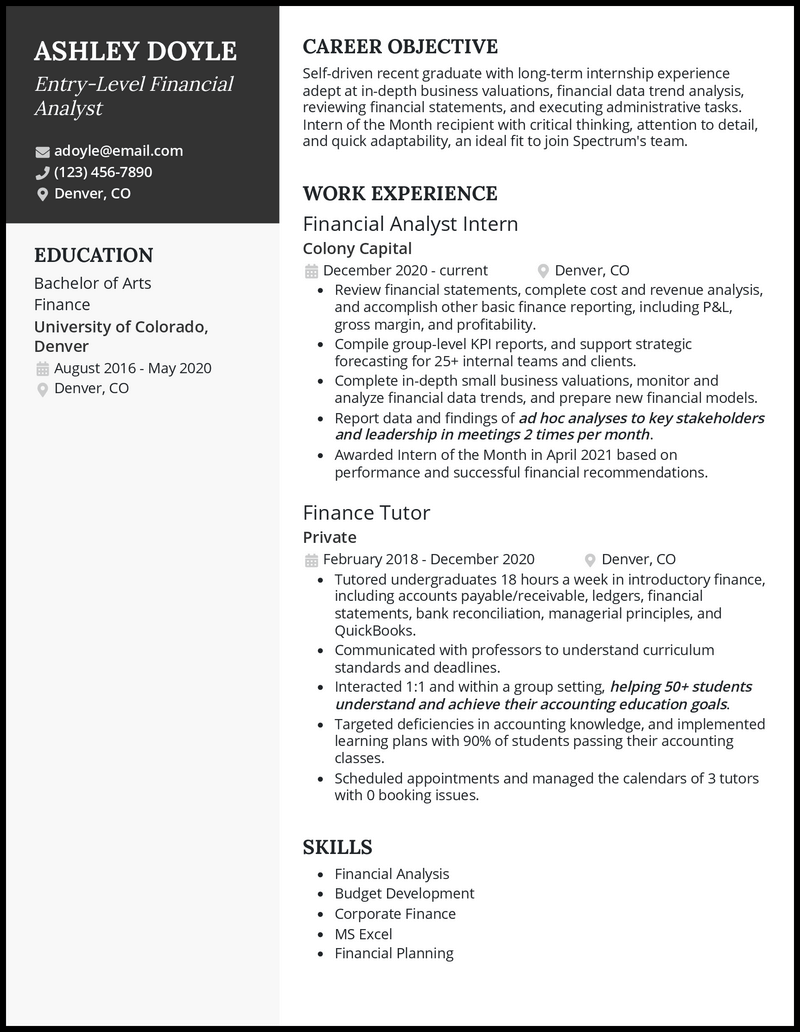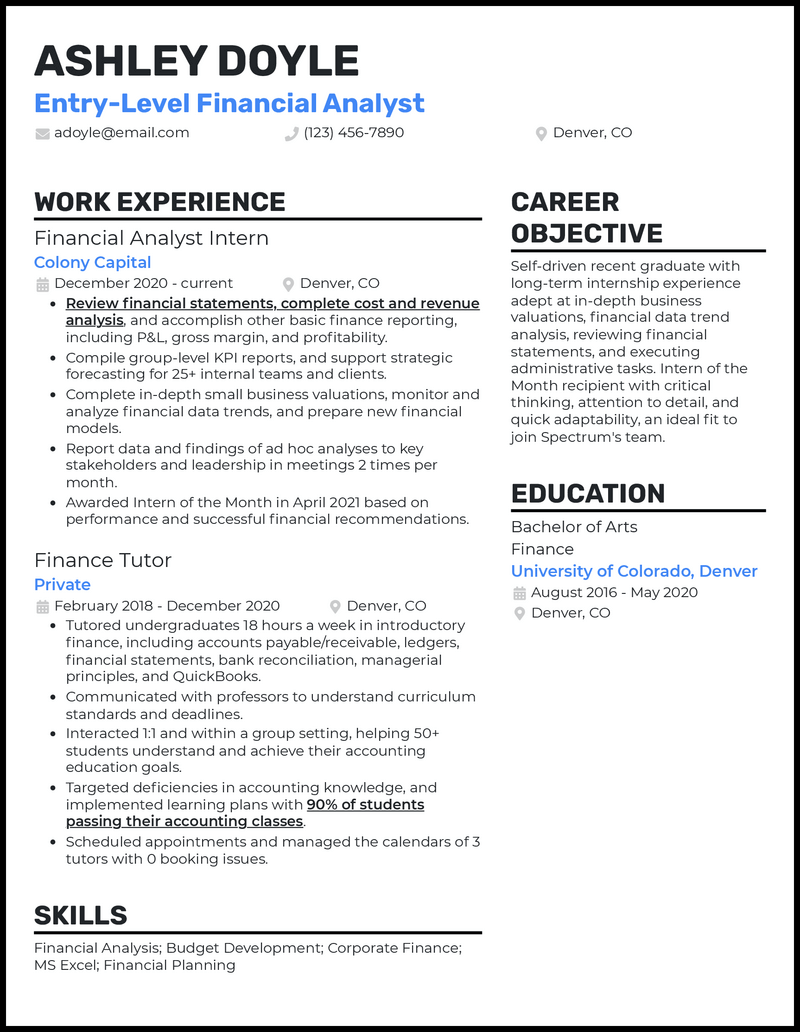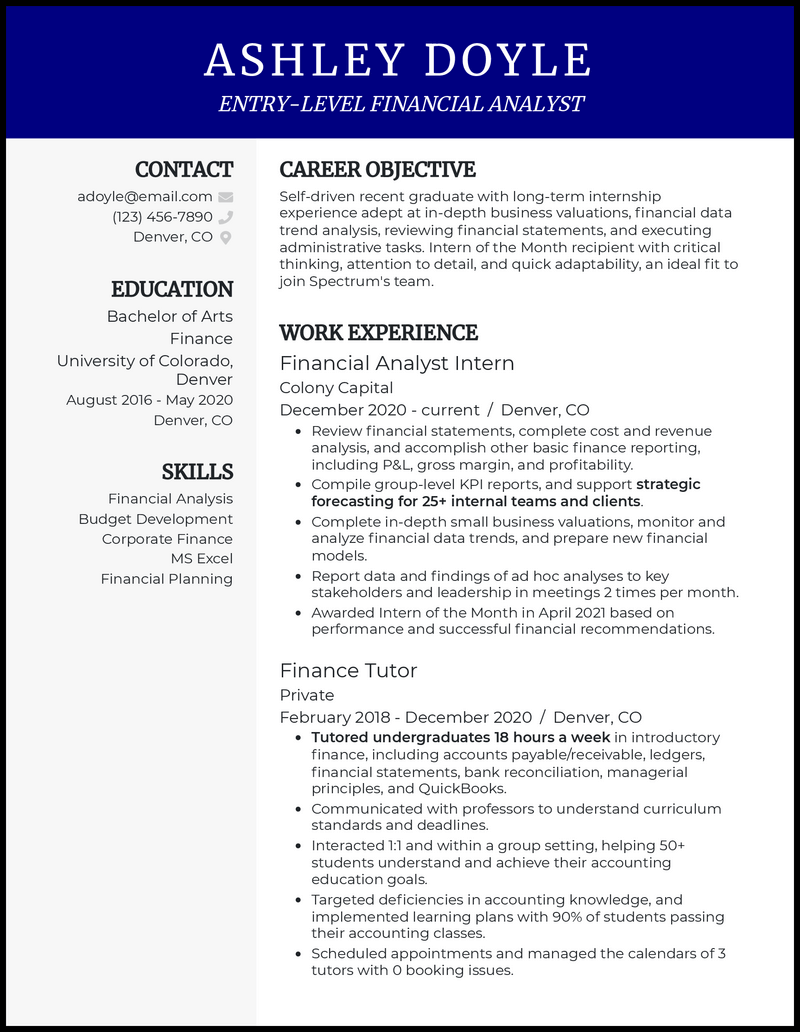As an entry-level financial analyst, you use your analytical prowess to translate complex financial data into actionable insights. You have a keen eye for spotting financial opportunities and speak numbers as a second language.
People with your skillset are certainly sought-after on the job market, but you still need a great resume to set yourself apart. But how do you impress employers with one page?
We’ve helped lots of folks land their dream roles in finance before, and we’re here to help you too. Check out our handy entry-level financial analyst resume templates and expert tips to set sail toward success.
Copy this text for your entry-level financial analyst resume!
Ashley Doyle
Entry-Level Financial Analyst
[email protected]
(123) 456-7890
Denver, CO
CAREER OBJECTIVE
Self-driven recent graduate with long-term internship experience adept at in-depth business valuations, financial data trend analysis, reviewing financial statements, and executing administrative tasks. Intern of the Month recipient with critical thinking, attention to detail, and quick adaptability, an ideal fit to join Spectrum’s team.
WORK EXPERIENCE
Financial Analyst Intern
Colony Capital
December 2020 – current
Denver, CO
– Review financial statements, complete cost and revenue analysis, and accomplish other basic finance reporting, including P&L, gross margin, and profitability.
– Compile group-level KPI reports, and support strategic forecasting for 25+ internal teams and clients.
– Complete in-depth small business valuations, monitor and analyze financial data trends, and prepare new financial models.
– Report data and findings of ad hoc analyses to key stakeholders and leadership in meetings 2 times per month.
– Awarded Intern of the Month in April 2021 based on performance and successful financial recommendations.
Finance Tutor
Private
February 2018 – December 2020
Denver, CO
-Tutored undergraduates 18 hours a week in introductory finance, including accounts payable/receivable, ledgers, financial statements, bank reconciliation, managerial principles, and QuickBooks.
-Communicated with professors to understand curriculum standards and deadlines.
-Interacted 1:1 and within a group setting, helping 50+ students understand and achieve their accounting education goals.
-Targeted deficiencies in accounting knowledge, and implemented learning plans with 90% of students passing their accounting classes.
-Scheduled appointments and managed the calendars of 3 tutors with 0 booking issues.
SKILLS
– Financial Analysis
– Budget Development
– Corporate Finance
– MS Excel
– Financial Planning
EDUCATION
Bachelor of Arts
Finance
University of Colorado, Denver
August 2016 – May 2020
Denver, CO
Why this resume works
- Starting off in the financial analyst game? Look, hammering out that entry-level financial analyst resume might feel like trying to solve a puzzle without the picture on the box. But here’s the inside scoop: a killer resume objective is all it takes to pull it off.
- Aim to pack your career objective with the highlights reel of your journey so far— think strengths you’ve honed during internships, school projects, or that side gig you’ve been grinding on. But don’t just leave it at that; make sure to tie in your aspirations for the role itself.
What Matters Most: Your Financial Analysis Skills & Experience

You can already find your way around numbers, data, and spreadsheets that are a mile long. Now, it’s time to put those career skills down on paper and let them shine in your resume.
In an entry-level financial analyst resume, your technical skills are your golden ticket. Yes, you’re ambitious and know how to work in a team of financial experts, but recruiters want to know whether you’re a whiz at Excel and Tableau instead.
Use this section to highlight your skills, and be specific. Each skill should correspond to something you can do instead of a personality trait. For instance, instead of “quick learner,” consider adding “data presentation” instead.
9 best entry-level financial analyst skills
- Tableau
- Financial modeling
- Portfolio management
- SAP
- Risk assessment
- Python
- Financial reporting
- MS Excel
- Valuation techniques
Sample entry-level financial analyst work experience bullet points
While your skills tell recruiters what you can do, your work history shows what you’ve already done. The only problem? You may not have much experience yet!
Don’t worry; you can leverage other work to show translatable skills or internships. Just like in all cost analysis and budget reports, data is the key to maximizing the impact of your resume.
Avoid blanket terms like “prepared financial reports for the CEO.” Instead, throw in some metrics to showcase how your reports increased revenue, improved the financial strategy of the company, or served to persuade key stakeholders.
Here’s how to best show off your achievements, whether from academic projects or internships:
- Leveraged Python and Tableau to create data visualizations for 30+ data sets, improving information flow and reducing meeting times by 20%
- Spearheaded the valuation of 8 target companies using CCA, PTA, and DCF, identifying an estimated $3M in potential revenue
- Analyzed financial statements of 50+ companies, conducting high-level risk assessment and financial projections to find 8 high-potential investment opportunities
- Contributed to a 13% increase in portfolio returns over a 7-month period, increasing market share by 4%
Top 5 Tips for Your Entry-Level Financial Analyst Resume
- Data is your best friend
- As an entry-level financial analyst, the best way to be noticed is to provide precise data about the impact of your work. State how much you could increase the portfolio size and discuss the savings made through your risk analysis. It’s all in the data.
- Save the soft skills for later
- Strong communication and attention to detail are necessary for your line of work, but save them for a cover letter maker or the interview. In your resume, talk about the technical aspects of your job, such as regression analysis or financial modeling. If you have any knowledge of Python, MatLab, or R, add that in too.
- Be flexible
- Be ready to shift things around to match the employer. Microsoft Excel is a staple, but some organizations may prefer QuickBooks over SAP for certain tasks. It’s okay if you don’t know a particular tool—add the ones you know because a company may be willing to train you.
- All experience is worth it
- You may not have previous work experience. In such a scenario, mention any relevant coursework from college (such as econometrics), internships you’ve attended, or even industry-adjacent positions. This includes tutoring and accounting.
- The industry matters too
- Tailor your resume to match not just the skills and the tools but also the industry. For example, if you’re applying for a role in banking, talk about things like assisting with a successful merger or calculating the ROI of short-term loans.
How to Write an Entry-Level Financial Analyst Resume

- Choose the right template for entry-level applicants
Many entry-level financial analysts can struggle to showcase relevant skills when they don’t have much work experience. Try choosing a template that allows space for an objective, hobbies/interests, or projects as needed. That way, you can showcase relevant skills like what you gained from an in-depth research project about the impact of economic policies on the financial market.
- Don’t forget about transferable skills
If you’re struggling to fill out the skills on your resume due to a lack of work experience, consider what can translate from work in other fields. Skills like data entry, cash handling, or inventory management that you may have done at other jobs will all translate well to the needs of a financial analyst.
- Lean on your financial education as needed
What you’ve learned while obtaining your degree in business finance or other related fields should be emphasized on entry-level resumes to show you have the right skills. It’ll demonstrate your top proficiencies in analyzing income statements and risk management analysis to stand out amongst applicants.
- Keep it to one page of relevant financial analysis abilities
It’s important for your resume to have a balance between being too long or too short, just like you’d want to do when writing up findings after a production spending analysis to make it easy to understand. Aim to keep your resume on one page while emphasizing key skills like financial modeling or forecasting.
An entry-level position may not require any, but you’ll stand out more if you add yours. If you have the Chartered Financial Analyst (CFA) or Financial Risk Manager (FRM) certifications, put them in your resume.
For a role as highly technical as an entry-level financial analyst, we don’t recommend re-using the same resume. Check out our easy resume templates to update your resume for each role.
Most recruiters search for candidates with bachelor’s or even master’s degrees. Add your education, complete with your major, and any relevant projects to your resume for your first financial analyst job.








